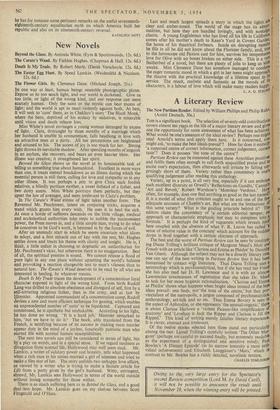A Literary Review
The New Partisan Reader. Edited by William Phillips and Philip P .ahY.
(Andre Deutsch. 30s.)
THIS is a significant book. The selection of seventy-odd contribution' covers almost ten years in the life of a major literary review and give° one the opportunity for some assessment of what has been achieved What would be one's measure of the ideal review? Perhaps one might steal Arnold's terms and apply them here. Is it concerned, oaf might ask, to make the best ideals prevail'? How far does it embod1 'a supposed centre of correct information, correct judgement, correct taste'? Does it possess 'the tone of the centre'? Partisan Review can be measured against these Arnoldian positive and fulfils them often enough to call forth unqualified praise and io excite one's expectation, then afterwards will irritate by falling sur prisingly short of them. Variety rather than consistency is one qualifying judgement after readiag this anthology. Variety, up to a point, is all very fine, especially if it can embriais such excellent diversity as Orwell's 'Reflections on Gandhi,' Camas I 'Art and Revolt,' Robert Warshow's 'Monsieur Verdoux.' H00 often, for example, does one find anything as good as the Last named? It is a model of what film criticism ought to be and one of the fol adequate accounts of Chaplin's art. But what are the limitations of this same variety? What is the guiding principle behind it? Tlis editors claim the consistency of 'a certain editorial temper, an approach or characteristic emphasis, not easy to compress into formula.' It is perhaps the kind of vagueness which reveals itself here coupled with the absence of what F. R. Leavis has called 11 sense of relative value in the concrete' which account for the sudden drops in level together with a certain chicness of approach. The best and the worst of Partisan Review can be seen by contrast° ing Diana Trilling's brilliant critique of Margaret Mead's Male and Female with an article like 'Clarissa and Emma as Phedre' by Dot °tin' Van Ghent. Although the subject may not be a directly literary ono, one can say of the best writing in Partisan Beview that it has be humanised by contact with literature. Thug Diana Trilling uses terminology which is psychoanalytical, but if she has read her Freud she has also read her D. H. Lawrence and it is with an alraosi Lawrencian concreteness of registration that she takes Dr. Mead to task for her more hygienic rationalisation. 'Clarissa and'Enalls as Phedre' shows what happens when bright ideas instead of the begs ideas prevail : one finds, not 'the tone of the centre,' but that Pro' vincialism of the metropolis, a jargon composed of psychoanalytic?, anthropology, art-talk and so on. Thus Emma Bovary is seen 10 the aspect of Aphrodite, or she represents 'the sensual-organic,' there is about Clarissa Harlowe a violent Picasso-like simplification 0' anatomy' and 'Lovelace is Jack the Ripper and Clarissa is Jill the Ripped.' This kind of writiag merely falsifies literary experience. It is clever, abstract and irrelevant. Of the twelve stories selected here three stand out particularlY among the rest: Lionel Trilling's carefully written 'The Other Mar' garet' (perhaps too careful to succeed finally, but extremely readable as the experiment of a distinguished and sensitive mind); Paul Bowles's 'A Distant Episode' (in its narrow intensity a most indi' vidual achievement) and/ Elisabeth Langgasser's Mars,' which 10 contrast to Mr. Bowles has a richly detailed, novelistic texture,
CHARLES TOMLE


































































 Previous page
Previous page